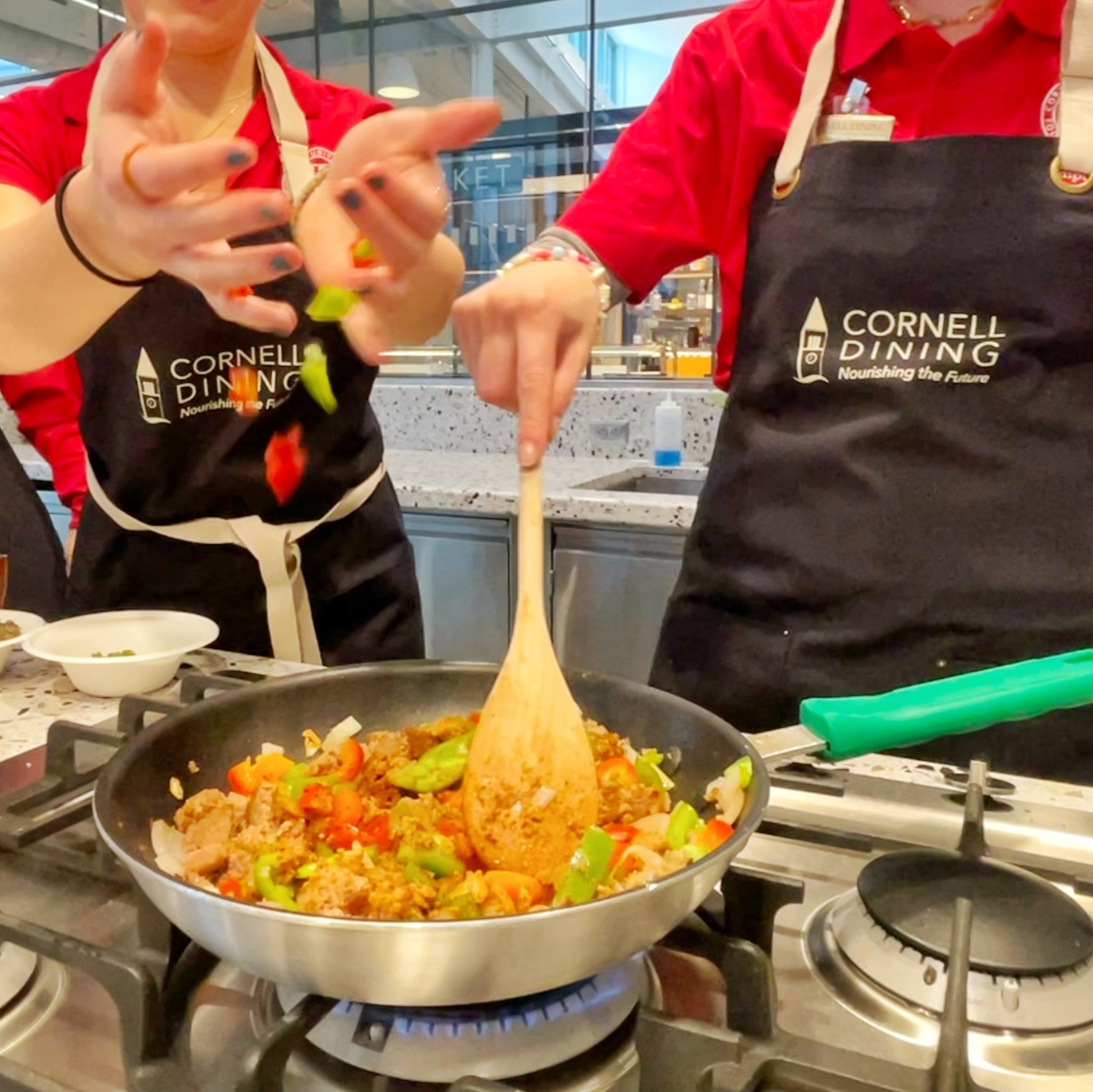Since 2007, when Cornell first committed to reducing its carbon footprint, Cornell Dining has been a leader amongst its peers in greening its operations. From composting food waste to incorporating more sustainably sourced menu options, Cornell Dining has redefined the conversation around sustainable dining at an institutional scale.
In 2023, Cornell University's dining program ranked second in the country according to the people who know best—the students who eat there. The Princeton Review tabulated this year's rankings from responses to surveys of 165,000 students at 389 schools.
“So often, people think sustainability means giving things up and a trade-off between scarcity vs. abundance,” says Sarah Carson, director of Cornell’s Campus Sustainability Office. “At Cornell Dining, doing things in a more sustainable way results in better quality and lower costs.”
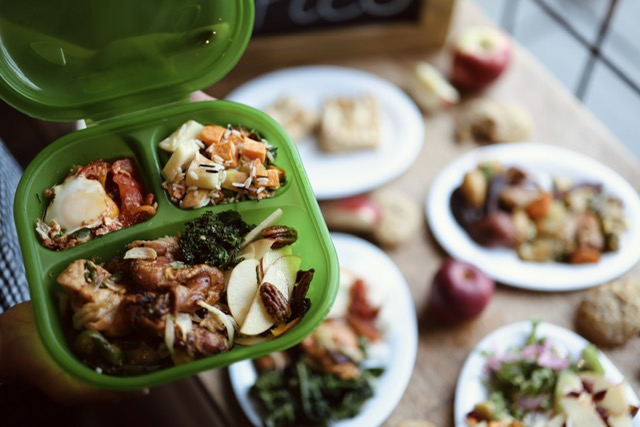
Sarah is a long-time proponent of incorporating more plant-based foods into her own diet, and she and her family enjoy eating the food they raise on their farm overlooking Keuka Lake— such as fresh eggs, and a rainbow of seasonal fruits and vegetables, including strawberries grown under the shelter of the farm’s solar PV array.
Over the past 15 years, there has been a groundswell of support from Cornell students for more plant-based, locally sourced, culturally sensitive menu options that respect the individual needs of guests. Cornell Dining serves more than 23,000 meals daily to a diverse group of diners, including international students from 130 countries who comprise 26 percent of the student body.
Students drive menu change
“Fostering more sustainable eating habits is a two-way street,” says Anna Ben-Shlomo, Cornell Dining’s first full-time sustainability coordinator, who was hired in January 2020. “Our students are demanding it, and we’re encouraging it at the same time.”
Cornell Dining signed the Forward Food Pledge in 2022, a Humane Society of America commitment to increase the proportion of plant-based meals served at campus eateries. Anna notes that Cornell Dining has committed to 45 percent plant-based retail entrée offerings by the end of 2024, and 50 percent by the end of 2027.
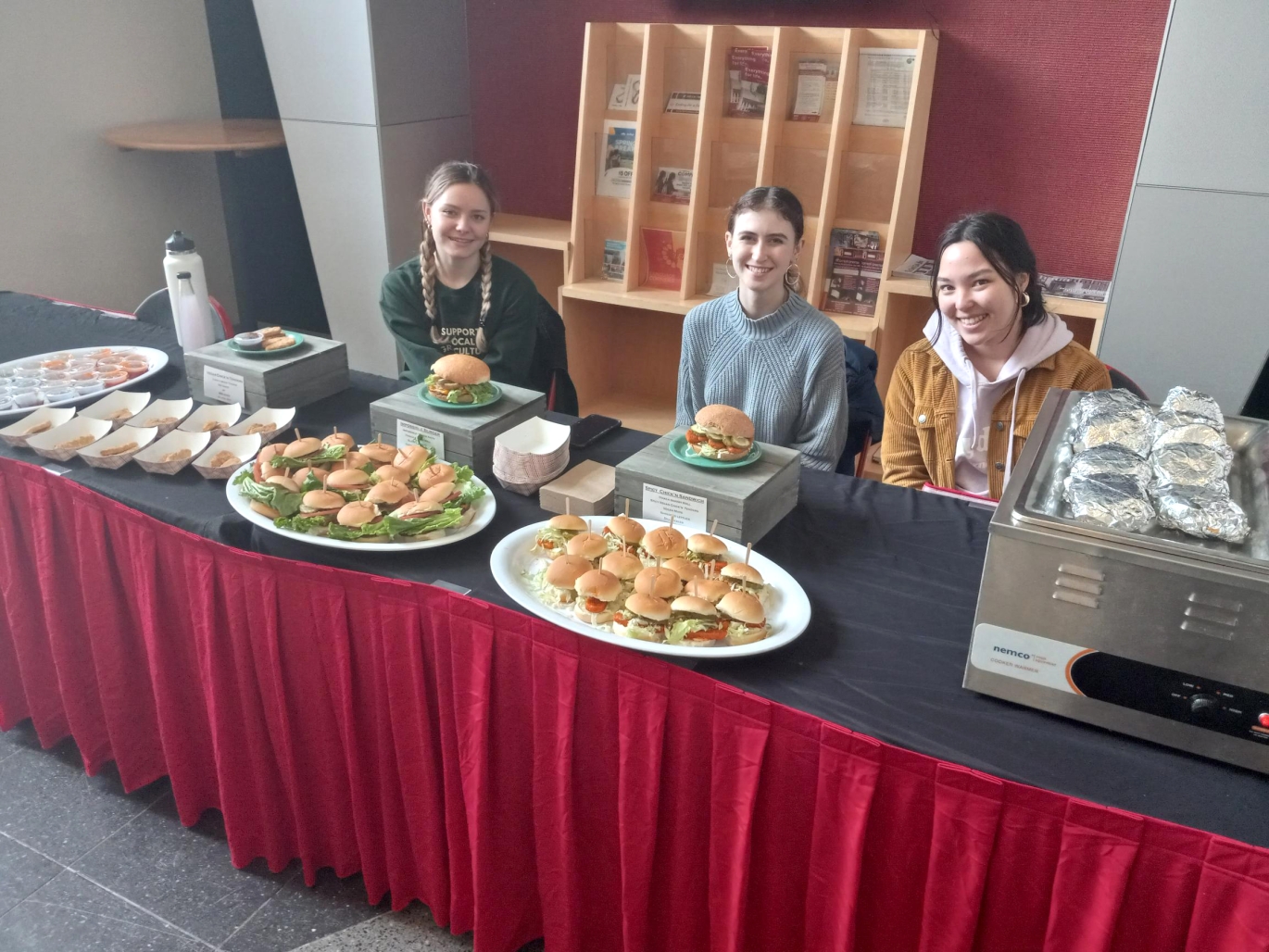
Serving more plant-based meals is a big win for Cornell’s goal of reaching carbon neutrality by 2035. “These meals are more environmentally friendly, use less water, energy, and land, and they release less methane and other greenhouse gases than production of meat,” Anna observes.
She notes that Cornell’s purchases of Marine Stewardship Council (MSC) certified sustainable seafood more than doubled in the past year (from 21% in fall 2022 to 48% in fall 2023)—another big sustainability win.
Cornell Dining hosts free “Get Cooking” events a few times each semester, to inspire students to try making their favorite recipes at home. Cornell Dining chefs show participants how to make plant-based tacos, pies, quiches, chili, cornbread, and more. “They see how to make dishes that are just as delicious as those made with animal ingredients, and how easy (and joyful!) it is to cook,” Anna says.
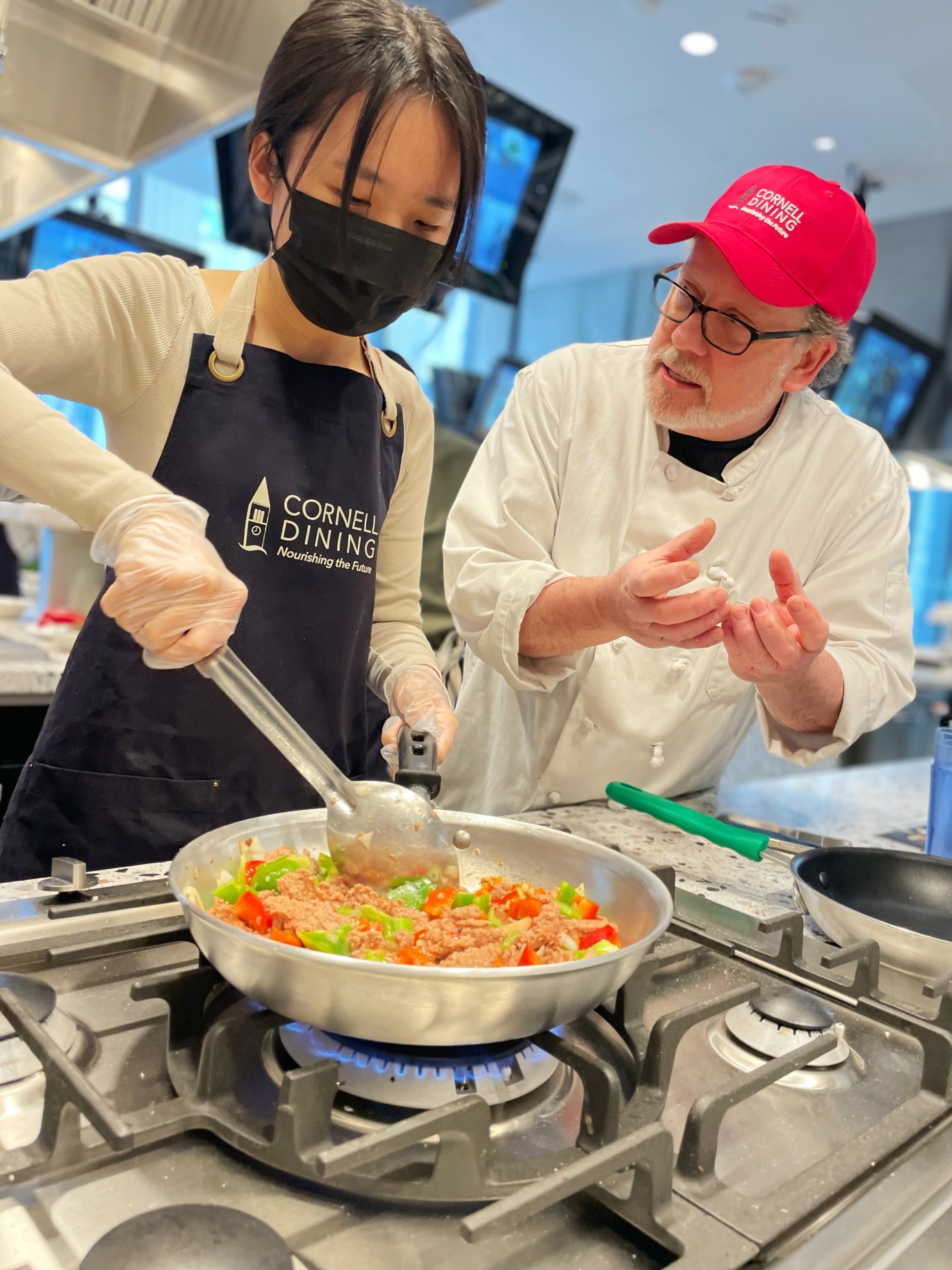
Get Cooking students ❤️ these classes:
“The staff was super helpful, knowledgeable, and friendly. They all genuinely wanted to be there and talk to us.”
“I like being able to learn a simple, delicious recipe that I can share with my friends and family in the future.”
“Recipes were super simple to follow :)”
“Collaborative. Learned new skills. Made new friends.”
Waste reduction yields big savings
Cornell Dining introduced trayless dining in 2008, as a two-pronged way to green operations. One goal was to create behavior change—so that diners would no longer fill their tray with multiple plates and end up throwing away what they didn’t eat. The second goal was to dramatically reduce the use of water and harsh detergents used to sanitize the trays. On both counts, trayless dining has been a big win.
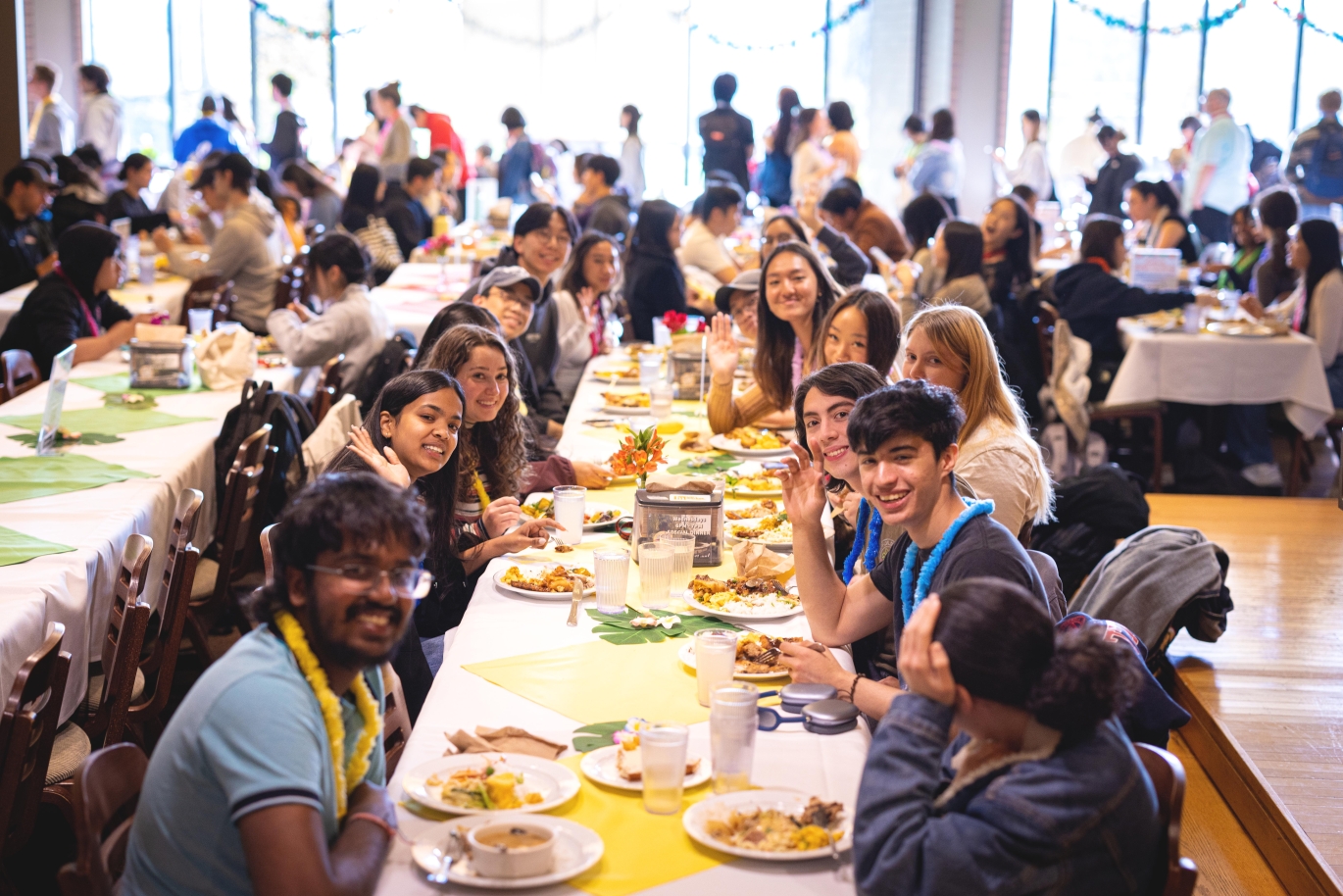
All Cornell Dining kitchens (including dining rooms, cafés, and catering operations) compost the food scraps that are produced during cooking and food preparation. The dining rooms also collect food scraps that are returned to the dish rooms by diners. Collectively, this food waste amounts to about 800 tons per year, all of which is composted by Cornell Farm Services and used as mulch on campus or sold to local landscapers.
“That’s an enormous reduction in what has to go to the landfill,” Anna says.
Cornell Dining started offering reusable takeout containers in 2017, and now eight of the ten residential dining rooms on campus use these rather than disposable containers. The two exceptions are 104West! (a kosher dining room) and Risley Dining (a gluten-free, tree-nut-free, and peanut-free dining room).
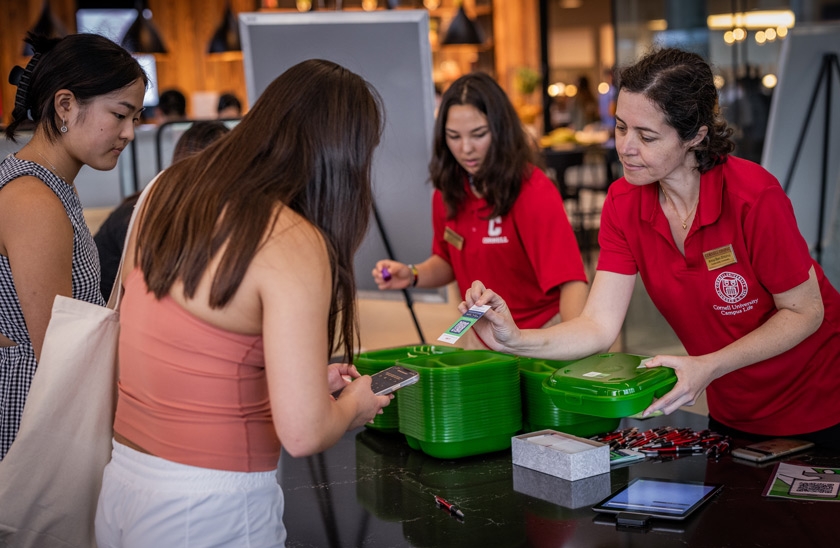
The reusable containers have resulted in thousands of dollars of cost savings and disposable plastic containers saved from the landfill. A new Fill It Forward program was implemented in 2023. Diners register, check out, swap, or check in their reusable takeout containers using a phone app. The app allows Cornell Dining to track overall usage and the program’s environmental impact, and each diner can also see the impact of their own usage.
According to Anna, the impact so far has been impressive. “We’ve had 36,126 total reuses through December 11, 2023. Fill it Forward estimates this equates to 973 pounds of waste diverted, 23,688 kilowatt hours of power saved, 41,859 pounds of emissions saved, and 260 square feet of land use saved.”
Tips for more sustainable eating
By Anna Ben-Shlomo
Eat more beans! Eat more plants, for sure.
Home composting isn’t too hard, especially in areas with food scrap collections.
Buy in bulk to reduce packaging. Bring reusable bags for fresh produce and for groceries in general.
Don’t forget your reusable water bottles and mugs.
Grow your own food, even if it’s just some herbs on a windowsill.
A student-run volunteer program called the Food Recovery Network collects prepared food that won't be served, but is still usable, from residential dining rooms, retail locations, and catering events. The students donate this food (averaging 2,500-3,000 pounds of food per year) to a local nonprofit, the Friendship Donations Network, which distributes it to area foodbanks.
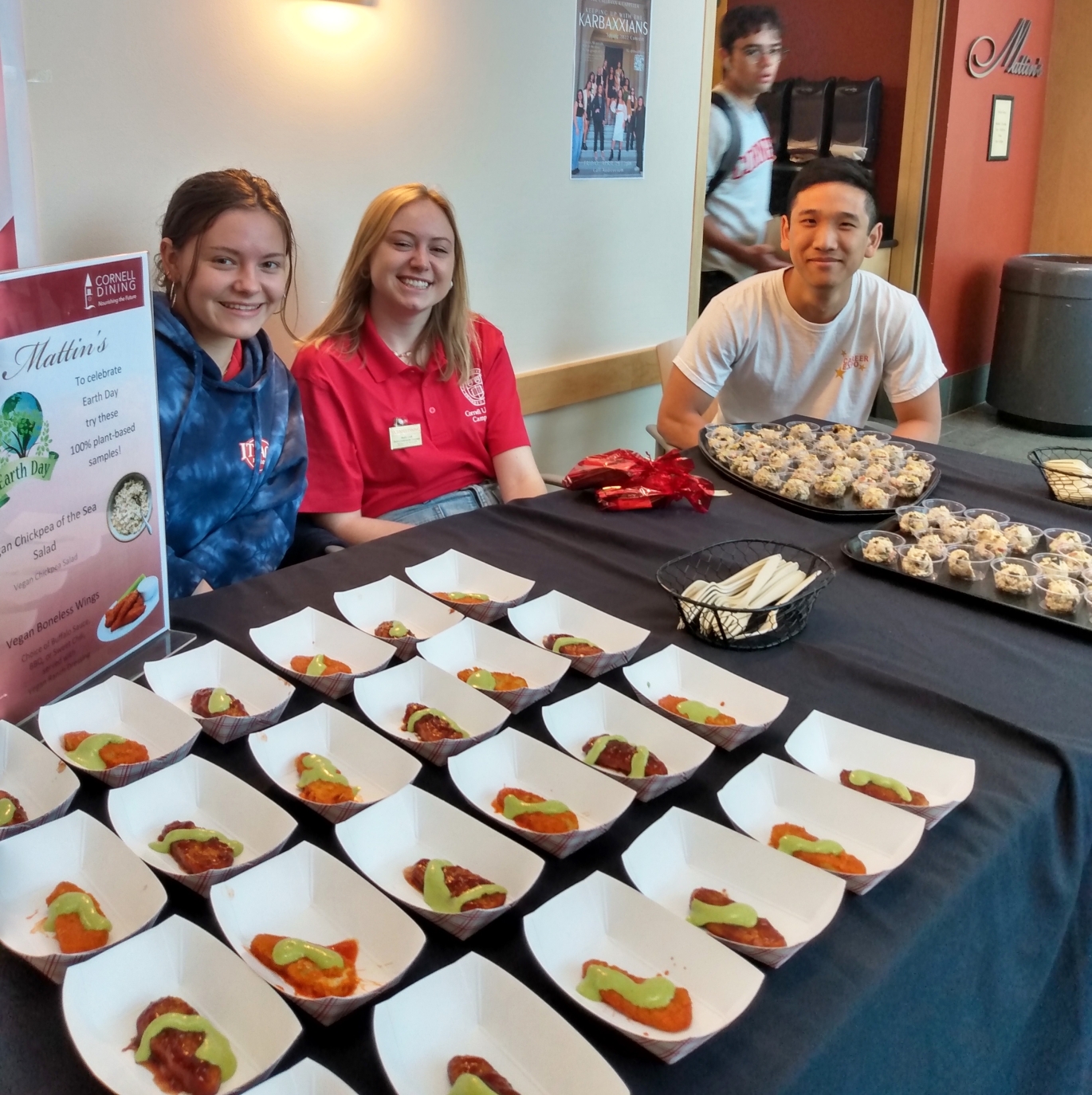
Another student-driven innovation is pre-sorting silverware at the dish drop—an initiative which has been successfully implemented at Morrison Dining on North Campus. Cornell Dining managers work closely with student dining “champions”—students who help motivate their peers to adopt greener behaviors and continue to look for ways to minimize waste.
“We engage with our students to see what motivates them to participate,” Anna says, “including incentives like discounts for use of reusable mugs.”
Looking ahead, Cornell Dining hopes to discourage the use of single-use plastic utensils, both by encouraging the use of reusable utensils and, when necessary, by offering more Earth-friendly disposable items.
Nutrition team meets students where they’re at
Cornell Dining employs three registered dietitian nutritionists to help help students with food allergies and other dietary restrictions navigate the dining program safely. The nutrition team works closely with chefs to review recipes, with colleagues involved in purchasing to review ingredient sourcing, and with students to respond to their priorities.
“We are constantly exploring new ways to add plant-based dishes to our menus, both to support students who prefer a vegan or vegetarian diet and to offer a better variety of meals to our omnivorous guests,” says Michelle Nardi'09, Nutrition Program Manager at Cornell Dining.
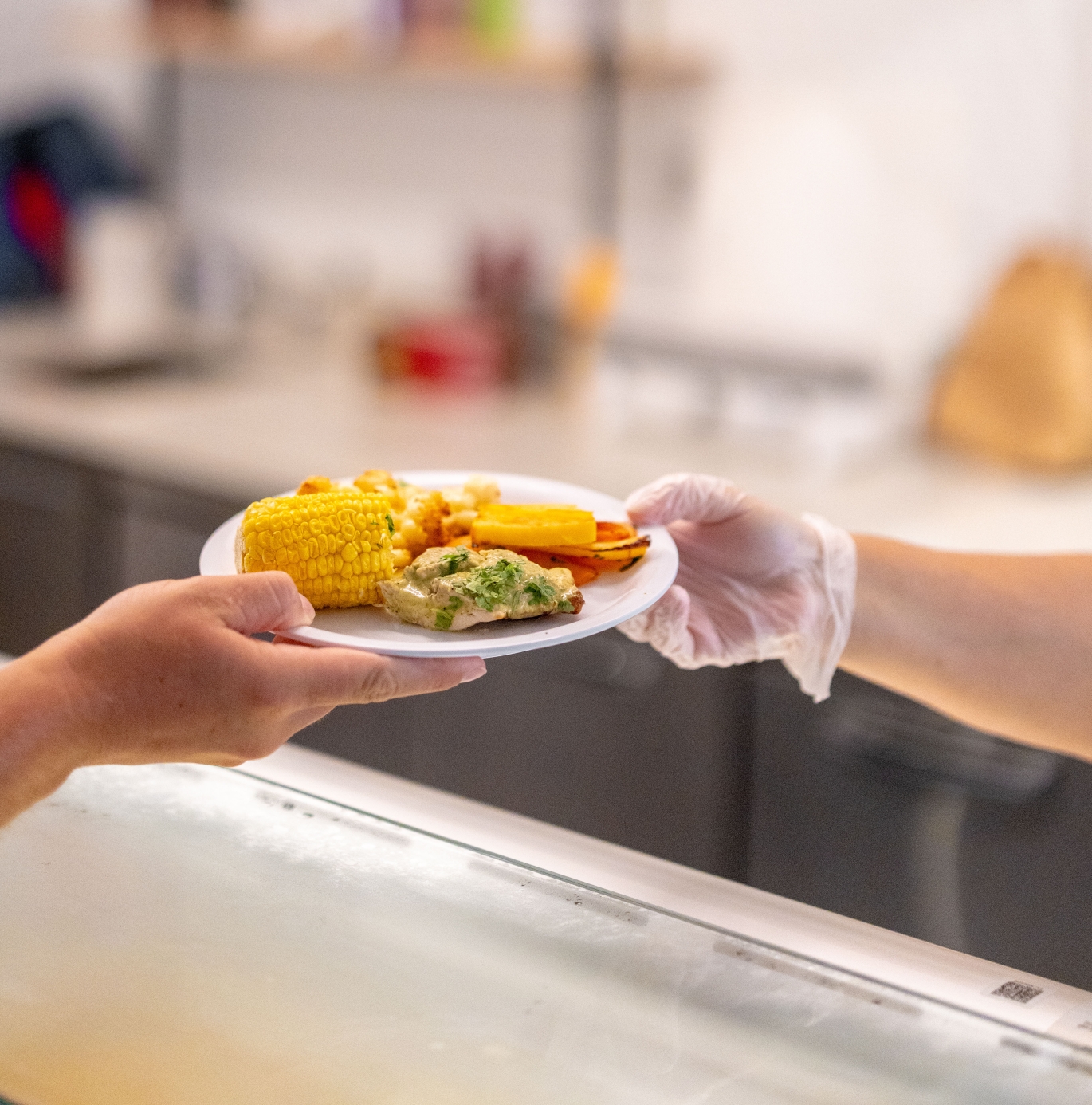
To meet the needs of students, Cornell Dining has expanded both its Halal-friendly and Kosher dining options.
“We now have a dedicated Halal station at Morrison Dining, our flagship residential dining room on North Campus, open for lunch and dinner daily. Halal meals are available upon request at Keeton House Dining Room each day on West Campus, and Halal-friendly meals are available for pickup weekdays at Okenshields on central campus,” Michelle explains.
“Our Kosher program has also expanded with a renovated kitchen at our 104West! multicultural dining room on West Campus, and Kosher meals available at a mashgiach-supervised dedicated Kosher station at Morrison Dining. Certified Kosher sandwiches and salads are prepared daily and distributed to retail locations around campus,” she adds.

